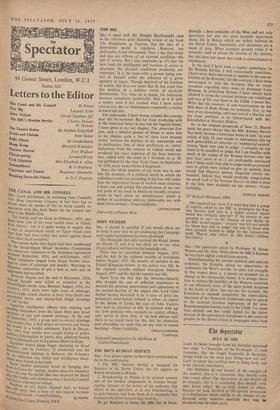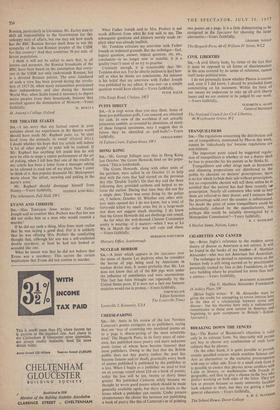SIR,—The questions asked by Professor H. Seton- Watson and Mr.
Peter Wiles about the BBC's Russian Service have rightly evoked keen interest.
Notwithstanding the present political and military stalemate, the Kremlin misses no opportunity to undermine the West's morale, its unity and strength. In this respect there is, it seems, no prospect for a change in the fas-eseeable future. It is strange there- fore to witness the inability of the Western countries to use effectively some of the most potent weapons in the battle of ideas. One can see, for example, the hesitation to unmask completely the imperialistic character of the Muscovite bolshevism and to appeal to the national freedom aspirations of the non- Russian peoples forcibly kept in the USSR. For some time already one has vainly hoped for the intro- duction of the appropriate broadcasts to the enslaved peoples in the Soviet Union in languages other than Russian, particularly in Ukrainian. Mr. Earley tries to shift all responsibility to the Government for this unhappy state of affairs, but one may ask how much has the BBC Russian Service itself done to win the sympathy of the non-Russian peoples of the USSR for this country? And they constitute 50 per cent. of Soviet population.
I think it will not be unfair to state that, to all intents and purposes, the Russian broadcasts of the BBC have been based on the assumption that every- one in the USSR not only understands Russian, but is a devoted Russian patriot. The utter falsehood of such a view has been proved during the revolu- tion of 1917-20, when many nationalities proclaimed their independence, and also during the Second World War, when Stalin found it necessary to deport entire peoples from their homelands, because- they revolted against the domination of Moscow.—Yours
St. Antony's College, Oxford THE THEATRE STAKES































 Previous page
Previous page